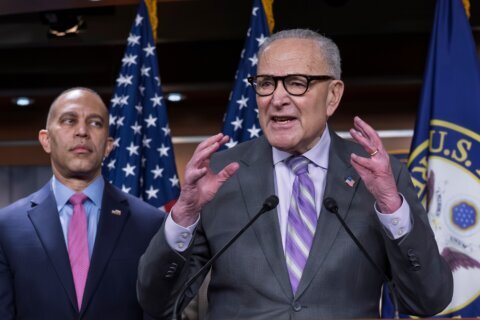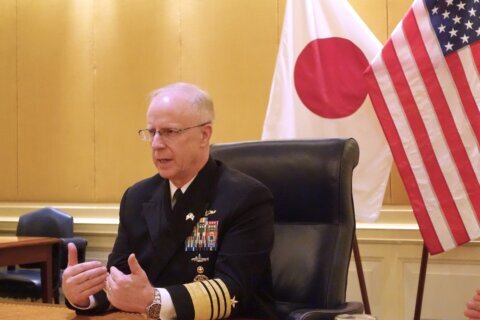The impeachment inquiry into President Donald Trump began Sept. 24. In this occasional feature, WTOP will touch on the week’s events — and answer some of the questions they raise — as this historic process unfolds in D.C.
Oct. 25–31
As last week wrapped up, Sen. Lindsey Graham had introduced a nonbinding resolution condemning the closed-door impeachment inquiry proceedings as unfair and secretive.
House Democrats unveiled a resolution days later to formalize the impeachment inquiry. It was approved Thursday in a vote of 232-196, mainly along party lines, and sets up the format for what happens next.
That will include open hearings.
In the words of Tom McCarthy at The Guardian, “The move was designed in part to remove the Trump administration’s main excuse for not cooperating with the impeachment inquiry.” A White House spokeswoman nevertheless attacked the announced resolution.
Closed-door proceedings proceeded in the meantime, with the most notable testimony coming from an Army officer working on the National Security Council. And in what seems to be a routine, those cooperating with House investigators did so after being subpoenaed — defying White House direction to not cooperate.
Q: With the inquiry formalized, what happens next?

Your favorite daytime programming will probably get preempted in a few weeks.
The rules call for open hearings and give a leading role to the Intelligence Committee, led by Rep. Adam Schiff. These rules also provide for longer, more intensive questioning, in part from congressional staffers. The Intel Committee will issue a report with its findings and recommendations.
Transcripts of the closed-door interviews will also be made public.
At the same time, the House Judiciary Committee, led by Rep. Jerry Nadler, will hold public hearings of its own and get materials from the other House committees that have been investigating Trump.
The Judiciary Committee will issue the final recommendation on whether to impeach.
House Republicans can issue subpoenas of their own during this process, but those would be subject to a full committee vote. This is similar to the powers minority Democrats had during President Bill Clinton’s impeachment.
As the proceedings continued behind closed doors Tuesday, Republicans said it was all too little, too late.
The resolution “does nothing to change the fundamental fact that House Democrats refuse to provide basic due process rights to the administration,” White House press secretary Stephanie Grisham told The Associated Press.
Q: Why is Lt. Col. Alexander Vindman’s testimony significant?
Vindman is the first White House official to testify. He appeared after a House subpoena, and his testimony further buttressed House Democrats’ case.

As the National Security Council’s top expert on Ukraine, Vindman was among those listening in on that phone call between Trump and Ukrainian President Volodymyr Zelenskiy on July 25. In prepared remarks released to the public Tuesday morning, Vindman described how he was so concerned after that call that he contacted an NSC lawyer.
He also told investigators how, months earlier, he had become “aware of outside influencers promoting a false narrative of Ukraine inconsistent with the consensus views of the interagency.”
And the Purple Heart recipient testified that on July 10, U.S. Ambassador to the E.U. Gordon Sondland had told a visiting Ukrainian official that “delivering specific investigations” was needed to secure a meeting between the two presidents.
Sondland later “emphasized the importance that Ukraine deliver the investigations into
the 2016 election, the Bidens, and [Ukrainian energy company] Burisma” during a debriefing, Vindman testified.
Vindman testified that he contacted NSC counsel after that incident as well.
In addition, Vindman reportedly said that he suggested key changes to that Zelenskiy-Trump call transcript, but that he was unsuccessful.
Another revelation from that testimony: An associate of Rep. Devin Nunes “misrepresented” himself to Trump “to involve himself further in Ukraine policy,” according to Natasha Bertrand at Politico.
Lt. Col. Alexander Vindman, the National Security Council’s top Ukraine expert, told lawmakers that after attending Ukrainian President Volodymyr Zelensky’s inauguration in May as part of a delegation led by Energy Secretary Rick Perry, Vindman had been looking forward to debriefing Trump and giving a positive account of Zelensky’s vision for Ukraine’s future.
… But he was instructed “at the last second” not to attend the debriefing, Vindman told lawmakers, because Trump’s advisers worried it might confuse the president: Trump believed at the time that Kashyap Patel, a longtime Nunes staffer who joined the White House in February and had no discernible Ukraine experience or expertise, was actually the NSC’s top Ukraine expert instead of Vindman.
Q: Why is Ukraine so important?
The nation has been at war with Russia-backed separatists ever since Russia’s annexation of Crimea in 2014, and it has been dependent on U.S. support.
In Vindman’s words, “a strong and independent Ukraine is critical to U.S. national security interests because Ukraine is a frontline state and a bulwark against Russian aggression.”
He echoed the sentiments of the top U.S. diplomat in Ukraine. Bill Taylor told investigators in his prepared remarks last week that “if Ukraine succeeds in breaking free of Russian influence, it is possible for Europe to be whole, free, democratic and at peace.”
In that context, Wednesday’s testimony from two other career diplomats reflect a negative view of that nation by the president. Catherine Croft, for instance, told the House panel in her statement that Trump has “a long-held view of Ukraine as a corrupt country.”
And Christopher Anderson recounted how White House officials “blocked an effort by the State Department to release a November 2018 statement condemning Russia’s attack on Ukrainian military vessels,” according to The Associated Press.
Q: Did Croft say anything else noteworthy?
She brought up a name that might sound familiar to Americans who’ve been to this impeachment rodeo more than once: Bob Livingston.
The D.C. lobbyist was a longtime congressman from Louisiana, and had helped push for the impeachment of President Clinton for perjury about an affair. Livingston was set to take over as House speaker in 1998, but accusations of his own marital infidelity would lead him to resign from Congress.
Flash-forward to the current situation. Livingston had pushed for Marie Yovanovitch to be removed from her post as Ukraine ambassador, Croft testified Wednesday. “It was not clear to me at the time — or now — at whose direction or at whose expense Mr. Livingston was seeking the removal of Ambassador Yovanovitch,” she said.

Q: Will the public hear from the whistleblower, whose complaint led to all this?
It’s somewhat doubtful.
One reason: It might not add much. While the whistleblower’s account of the July 25 Trump-Zelenskiy phone call was secondhand, Vindman provided investigators Tuesday with a firsthand account of it.
That’s in addition to all the other supporting evidence from previous witnesses.
Another reason: The smears et al. that the whistleblower would receive from Trump loyalists. Just see what was being said about Vindman before he even testified.
Similarly, a report Tuesday in The Daily Beast said that an aide to GOP Rep. Devin Nunes has been sharing the whistleblower’s name in an attempt to get it into a record of the closed-door proceedings.
Q: How’s the White House’s stonewall holding up?
It’s seen better days, but it’s somewhat functional at the moment. Case in point: Charles Kupperman. The former deputy national security adviser had been subpoenaed and was set to appear on Monday. As with others, however, he’d been directed by the White House to not appear.
So Kupperman filed suit in federal District Court on Friday and asked a judge to decide for him.
“It would not be appropriate for a private citizen, like Dr. Kupperman, to unilaterally resolve this momentous constitutional dispute between the two political branches of our government,” wrote his attorney, Charles Cooper.
(Cooper, it should be noted, also represents former national security adviser John Bolton, who was invited Wednesday to testify to the panel Nov. 7.)
Yet Kupperman still risks contempt-of-Congress charges, warned a letter from Schiff, acting House Oversight and Reform Committee Chairwoman Carolyn Maloney, and House Foreign Affairs Committee Chairman Eliot Engel.
Earlier:







